Could a magnesium shortage be responsible for your persistent swelling? Whether it be bronchial asthma or diabetes, inflammation is usually the perpetrator. We understand that inflammation is triggered by concerns such as anxiety as well as way of living, yet a particular vitamin deficiency might be the transgressor!
Research studies prove that magnesium is vital to decreasing swelling.
Below’s just how to find the link as well as easy methods to integrate even more magnesium into your diet!
What is Swelling?
Swelling is the immune system’s reaction to an infection, irritability or injury. It is characterized by an increase in white blood cells, heat, swelling, pain or organ disorder. Inflammation can be activated by both interior and exterior settings, such as interior hormonal agent discrepancies or a poor diet plan.
Swelling can materialize itself in various parts of the body, under different names. For example, those that struggle with asthma experience inflammation of the nose.
Inflammation can be both be intense or persistent. While severe swelling lasts for just a few days and the response normally promotes recovery, persistent inflammation hinders your body feature and also physiology.
Inflammation as well as Magnesium
Magnesium regulates cellular events involved in inflammation. A magnesium discrepancy creates as well as underpins inflammatory accumulate. In other words, magnesium literally places the cool on swelling. As a result, a boost in your body’s focus of magnesium creates a decrease in the inflammatory action.
According to Dr. A. Mazur’s study on inflammation and pain monitoring, “Magnesium deficiency induces an organized stress and anxiety” as well as “contributes to an overstated reaction to immune tension and oxidative stress and anxiety is the effects of the inflammatory feedback.”
Magnesium has verified to lower swelling, halt as well as minimize inflammation and also avoid the advancement of metabolic disorder.
It’s a win-win! Not just will magnesium reduce current inflammation in the body, but it additionally aids prevent future inflammation-related ailments.
Incorporating Even More Magnesium right into Your Diet plan
Though supplements are readily available, obtaining magnesium right into your diet plan naturally is always optimal! Attempt including these simple foods right into your diet plan to increase your magnesium usage:
Nuts as well as seeds (a 1/2 cup of pumpkin seeds provides you with 100% of your day-to-day requirement).
Avocado ( including one slice of avocado corresponds to 15% of your recommended everyday usage).
Bananas ( 32 milligrams of magnesium per banana!).
Top Magnesium Supplement Forms
There are A TON of different types of magnesium that are sold in stores. Many of these simply are not effective and will not do anything beneficial for your health. In fact, some forms of magnesium are not even absorbable by your digestive tract.
Below are some of my favorite forms of magnesium and the ones that are the most likely to benefit your health.
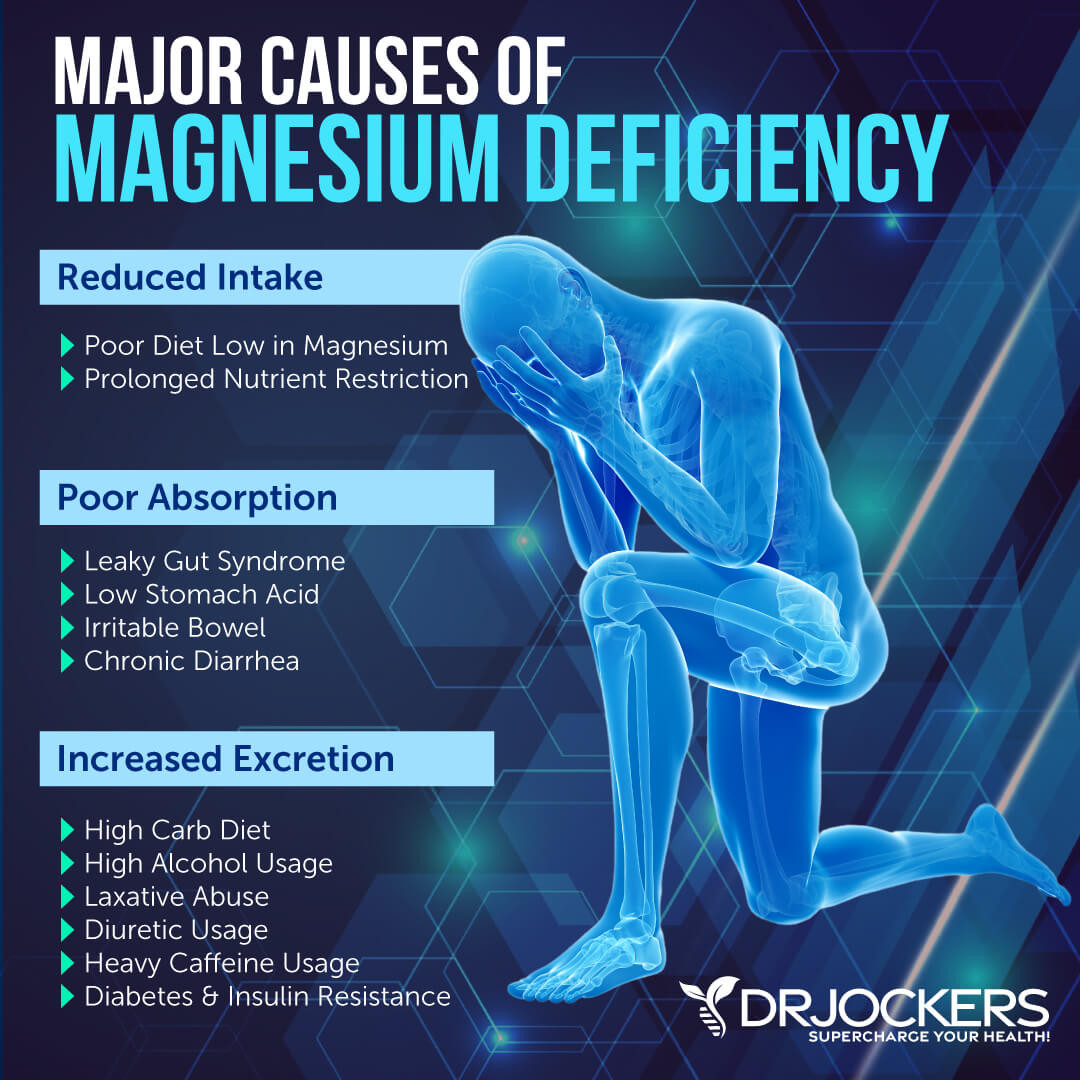
Malate
Magnesium malate is magnesium bonded to malic acid. Malic acid is naturally occurring in many foods, especially fruits. This form of magnesium is theorized to be best suited for improving energy-related disorders.
This is thought because malic acid is a key component of the Krebs Cycle. The Krebs Cycle is the biological process that is responsible for manufacturing ATP, AKA energy. This is where magnesium malate may be helpful in conditions such as chronic fatigue or depression.
Animal studies have observed that magnesium malate may provide benefits for blood sugar regulation and magnesium/calcium balance, making it a solid option for supplementation (3).
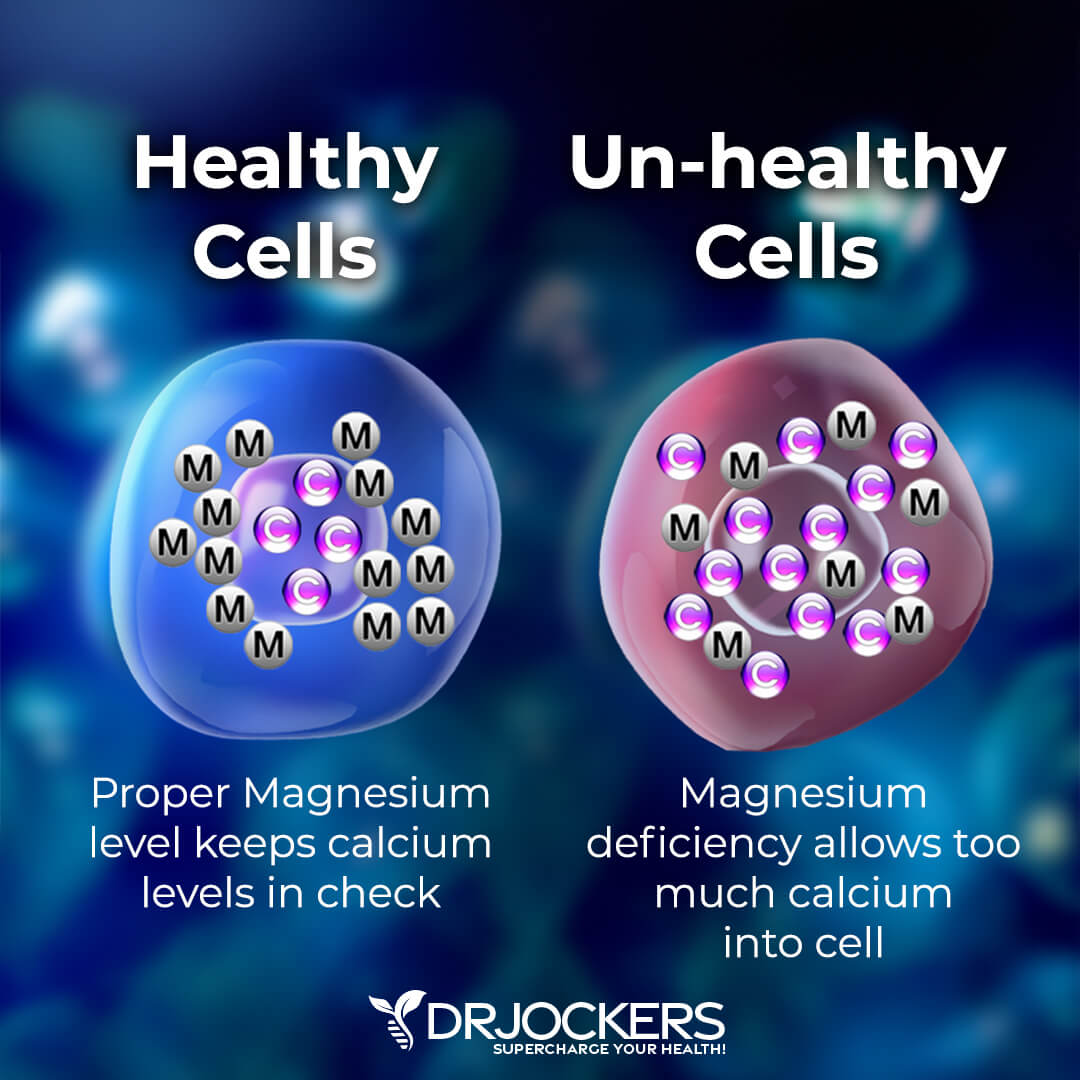
Glycinate
Magnesium Glycinate (or chelated magnesium) is a compound made up of magnesium and the amino acid glycine. This is thought to be one of the most bioavailable forms of magnesium for supplementation as well as one of the most gut friendly. Many people experience diarrhea with magnesium supplementation so this can be an important consideration.
For clinically diagnosable magnesium deficiency (hypomagnesia), the glycinate or bisglycinate form of magnesium are typically the most recommended for correcting this.
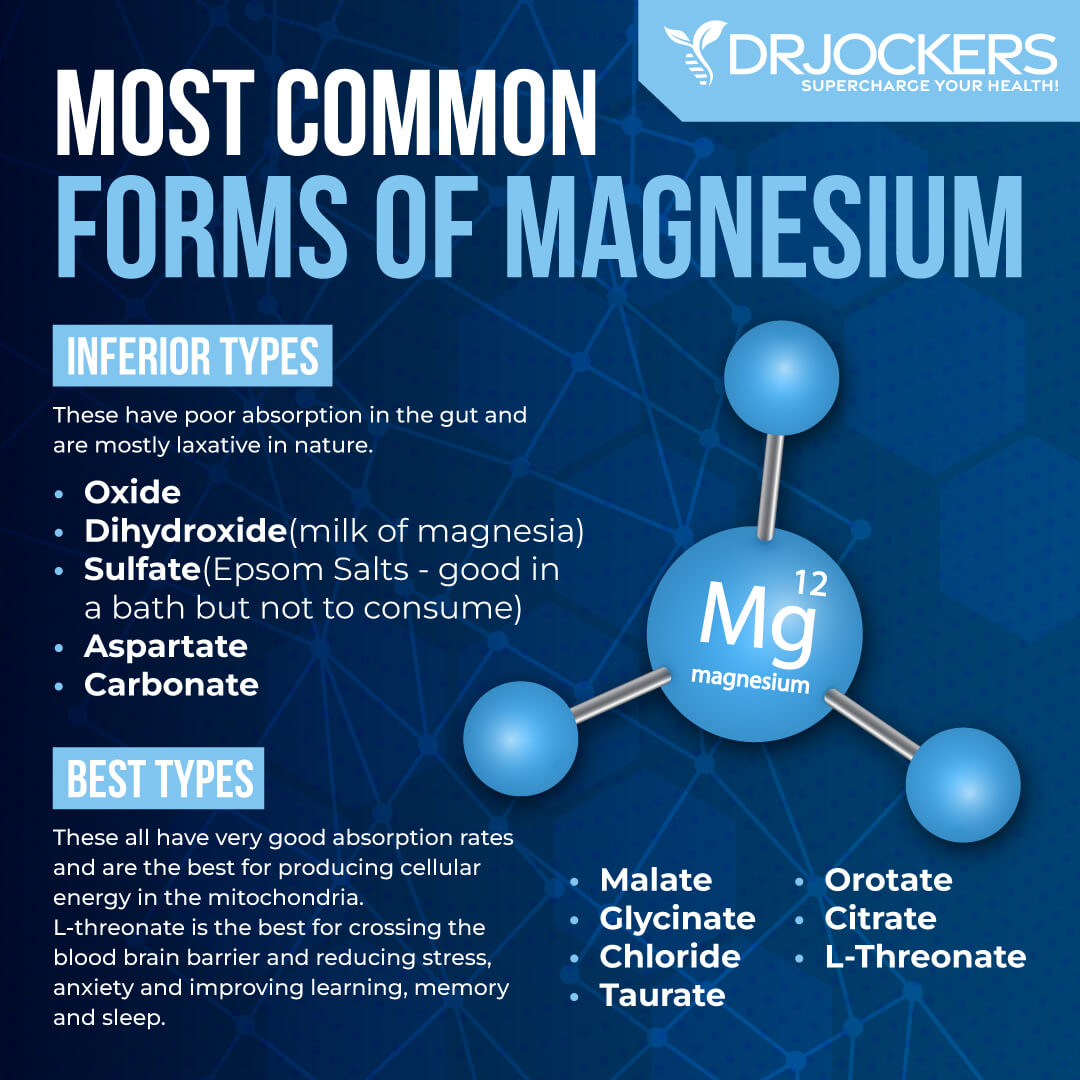
L-Threonate
Magnesium L-threonate (MgT) is a newer form of magnesium with significant implications for mental health. Some preliminary research has highlighted the cognitive boosting ability and potentially even neuroprotective effects against Alzheimer’s disease (4).
What is so novel about this form of magnesium supplement is that it is the only form shown in animal studies to cross the blood brain barrier. This is important because having this capability allows it to exert its beneficial effects on the brain specifically.
Consequently, this form of magnesium supplement has been shown to improve measures of cognitive abilities such as short and long term memory and learning (5, 6). Additionally, this form of magnesium may be superior for conditions such as depression, anxiety, and brain fog.
In this article, I go over this 2010 study where a MgT supplemented group was able to retain their memory of where a submerged platform was hidden after 24 hours. Both young and old rats in the control group forgot and began randomly searching through the maze and took more than twice as long as the MgT supplemented group. The results of the study showed that old rats saw a 100% improvement in spatial long-term memory and even out performed younger rats who had not used MgT (5).
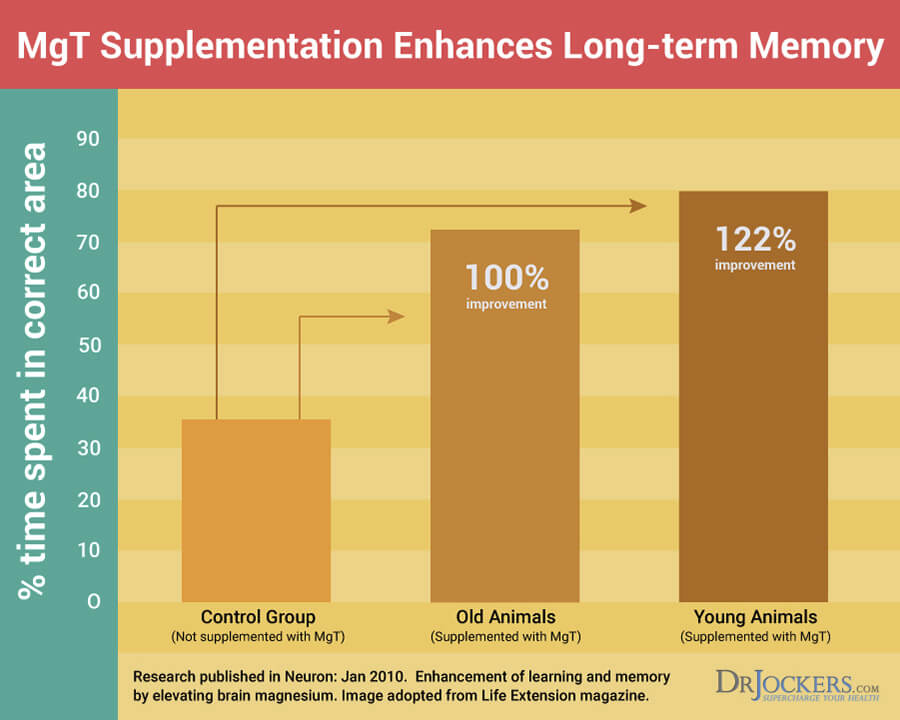
Citrate
Magnesium Citrate is one of the most commonly used forms of magnesium because it is relatively low cost while also being reasonably bioavailable when consumed orally.
This form of magnesium supplement is unique because it is one of the only ones that is naturally acidic. This is due to it being bound to citric acid, a common food additive that also occurs in citrus fruits.
Two noteable properties of this form of magnesium are its ability to aid in bowel movements as well as potentially help with oxalate metabolism. I often encounter patients who have kidney stones due high levels of dietary oxalates (more on this here) so this may be helpful for them.
While it may be beneficial for someone with kidney stones to supplement with magnesium citrate, I have actually found potassium citrate to be powerful for this. In combination, they may both provide benefits.
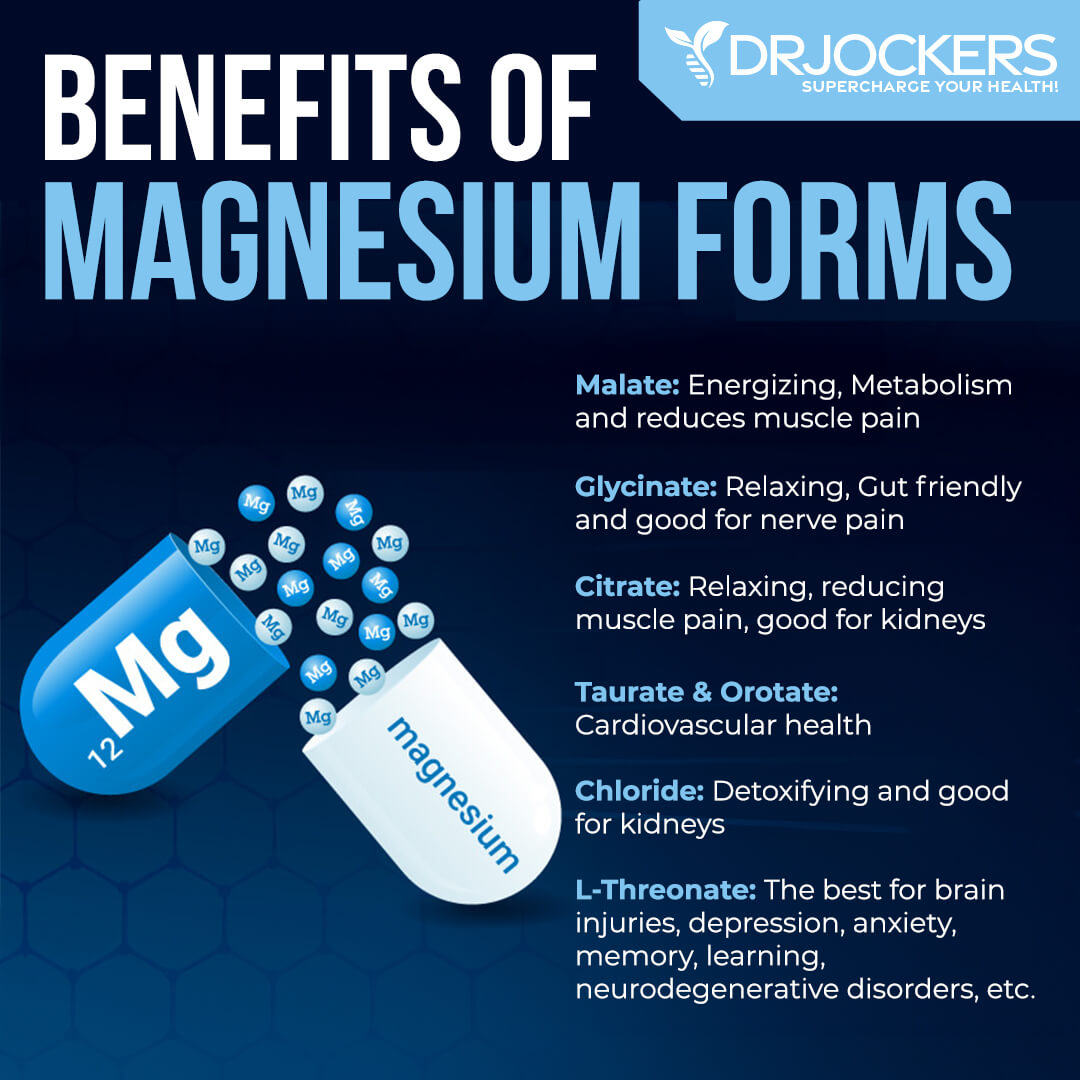
Chloride
Adding a chloride to magnesium brings another broad-range support compound to the mix. When these two are broken down in the body, you get the benefits of both magnesium and chloride. Magnesium chloride is the most stable form of magnesium and is especially good for detoxification and for kidney function.
Chloride ions are abundant in the human body. First of all, as an electrolyte, chloride ions help to assure the proper conduction of impulses within the nervous system. They work along with potassium, sodium, calcium, phosphate, and magnesium to assure proper muscle contraction, control blood pressure, and allow for healthy brain function.
Additionally, chloride combines with hydrogen in the gut to produce HCl (stomach acid). Adequate stomach acid is needed to properly digest our foods and to activate intrinsic factor for absorbing Vitamin B12.
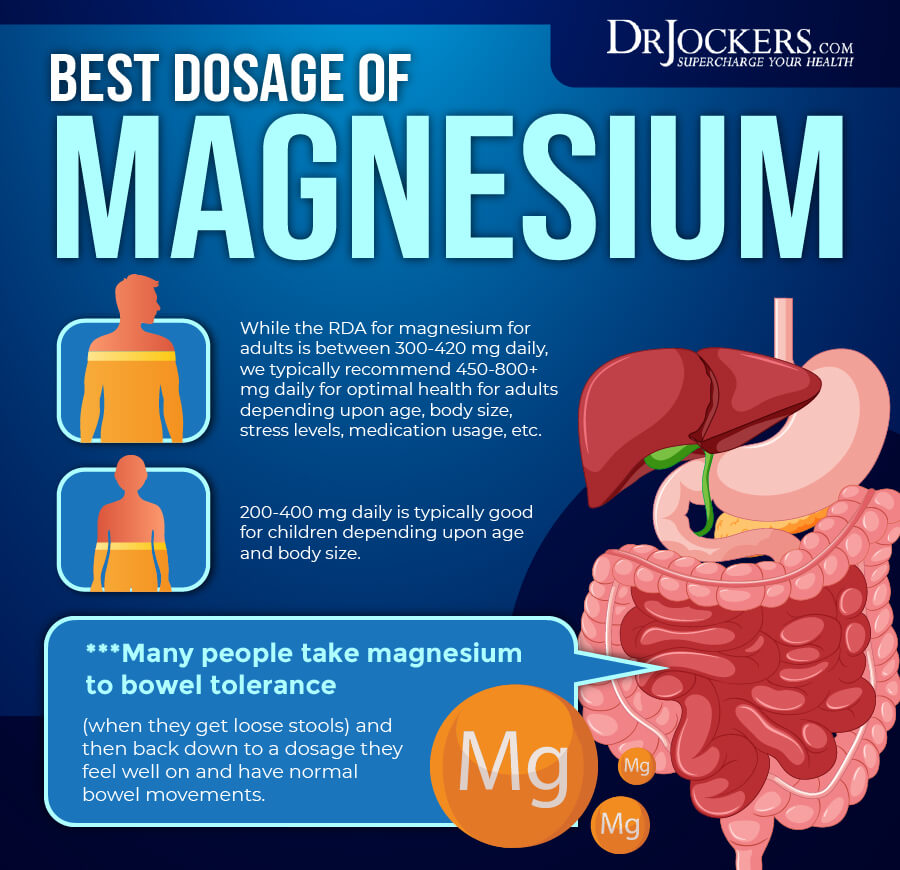
Inferior Magnesium Supplement Forms
Forms of magnesium that are often cheap yet offer relatively low bioavailability include the oxide, dihydroxide (milk of magnesia), sulfate, aspartate, and carbonate forms. These forms of magnesium do not absorb well and tend to offer little benefit beyond laxative or antacid properties.
Magnesium Sulfate (also known as epsom salt) may, however, be suitable for absorption through the skin. For a step above, in my opinion, I would recommend these Magnesium Chloride salts for soaking. They are more expensive but likely to be much more beneficial.
Top Magnesium Foods
While magnesium supplementation is often a great idea, eating the right foods is just as important. In the video below I go into detail on my favorite dietary sources. For convenience, I have listed my top 12 below.
- Swiss Chard
- Spinach
- Grass-fed Dairy
- Avocados
- Pumpkin Seeds
- Pink Salts
- Nuts
- Dark Chocolate
- Wild-Caught Fish
- Sprouts
- Sea Vegetables
- Organic Coffee